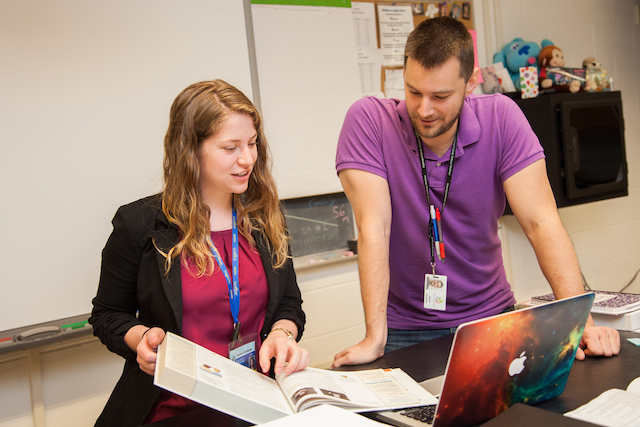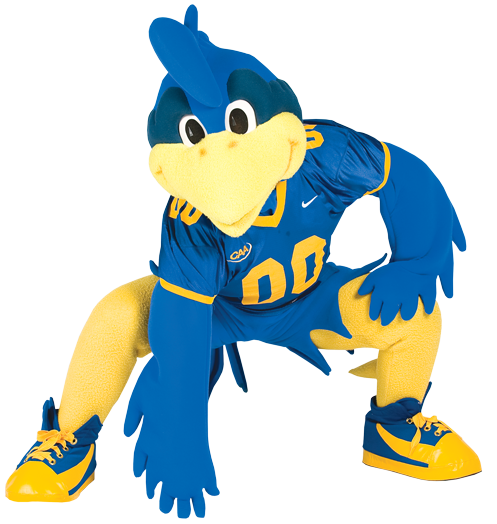
MAJOR FINDER
Filter by College
Filter by Subject
Physics Education

STUDY PHYSICS AND LEARN TO TEACH IT
Physicists investigate the fundamental properties of our physical world and develop a quantitative understanding of its phenomena with the scale of the investigations ranging from the sub-atomic to the transgalactic. Physics and astronomy have had a profound impact on how we perceive the universe and our position in it. The Secondary Science Education major at the University of Delaware offers students interested in teaching middle or high school science the opportunity to study their scientific area of interest—like physics—while also learning about and practicing the best teaching methods.
RELATED MAJORS
AREAS OF STUDY
- Atomic Physics
- Plasma Physics
- Space Physics
- Learning Science
- Adolescent Development
- Teaching Methods
- Biophysics
- Particle Physics
- Laser Physics
CAREER OPTIONS
- High School Teacher
- Middle School Teacher
- Department Chair
- Teacher Leader
- Principal
- Instructional Coach
- Textbook Author
GRADUATE PROGRAMS
- Science Education
- Curriculum and Instruction
- Educational Technology
- Counseling
- Teacher Leadership
- Educational Leadership
What’s special about this program?
The Secondary Science Education Program has a partnership agreement with a local school district. Science teachers collaborate with university personnel to provide an innovative science education program that culminates in a capstone experience of student teaching. The Secondary Science Education Program has led the university in using coteaching as a model for student teaching. This innovative approach on learning to teach emphasizes professional collaborations between students and teachers. Physics education students are introduced to STEM and various education technologies to enhance their teaching practice. The university’s clinical faculty oversee the physics education students’ field experiences and provide professional development to the district’s science teachers.
Sample curriculum
FALL
PHYS207 and PHYS227 (lab)
|
Fundamentals of Physics I (and lab)
|
| PHYS169 | Perspectives on Physics and Astronomy
|
MATH241 or MATH231 and MATH232
|
Analytical Geometry and Calculus A or Integrated Calculus IA and Integrated Calculus IB
|
CHEM103 and CHEM133 (lab)
|
General Chemistry (and lab)
|
| UNIV101 | First Year Experience I
|
SPRING
PHYS208 and PHYS228 (lab)
|
Fundamentals of Physics II (and lab)
|
MATH242
|
Analytic Geometry and Calculus B
|
CHEM104 and CHEM134
|
General Chemistry (and lab)
|
ENGL110
|
Seminar in Composition
|
Foreign Language Requirement (1/3)
|
FALL
| PHYS211 | Oscillations and Waves
|
| Physics Elective | PHYS310 - Introduction to Thermal Physics (Recommended)
|
| MATH243 | Analytical Geometry and Calculus C
|
Foreign Language Requirement (2/3)
|
|
University Breadth Requirement (1/9)
|
SPRING
| PHYS309 | Physics of the Twentieth and Twenty-First Centuries
|
| Physics Elective | PHYS209 - Aspects of Modern Physics (Recommended)
|
Foreign Language Requirement (3/3)
|
|
University Breadth Requirement (2/9)
|
|
| CISC106 | General Computer Science for Engineers
|
FALL
| Physics Elective | PHYS424 - Quantum Mechanics I (Recommended)
|
| EDUC413 | Adolescent Development and Educational Psychology (DLE Requirement)
|
| MATH302 | Ordinary Differential Equations
|
University Breadth Requirement (3/9)
|
Second Writing Requirement
|
| University Breadth Requirement (4/9) |
SPRING
| Physics Elective | PHYS333 - Fundamentals of Astrophysics
|
| EDUC414 | Teaching Exceptional Adolescents
|
| Physics Elective | PHYS313 - Physical Optics (Recommended)
|
University Breadth Requirement (5/9)
|
|
University Breadth Requirement (6/9)
|
FALL
| EDUC420 | Reading in the Content Areas
|
| SCEN491 | Teaching Science in Secondary Schools
|
University Breadth Requirement (7/9)
|
|
University Breadth Requirement (8/9)
|
|
| EDUC419 | Diversity in Secondary Education (Multicultural Requirement)
|
SPRING
| EDUC400 | Student Teaching (Capstone)
|
University Breadth Requirement (9/9)
|
|
Free Elective (1/1)
|

